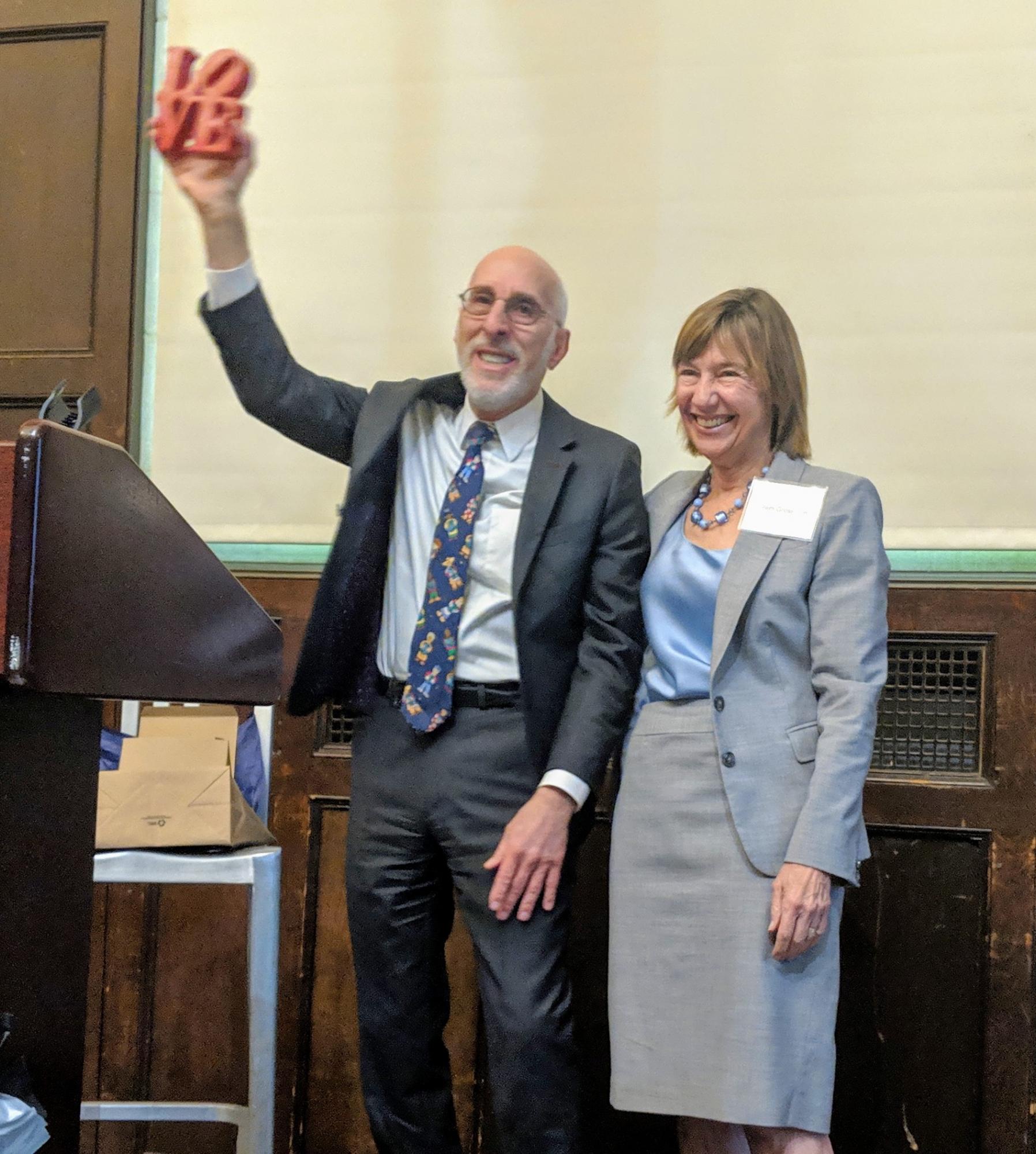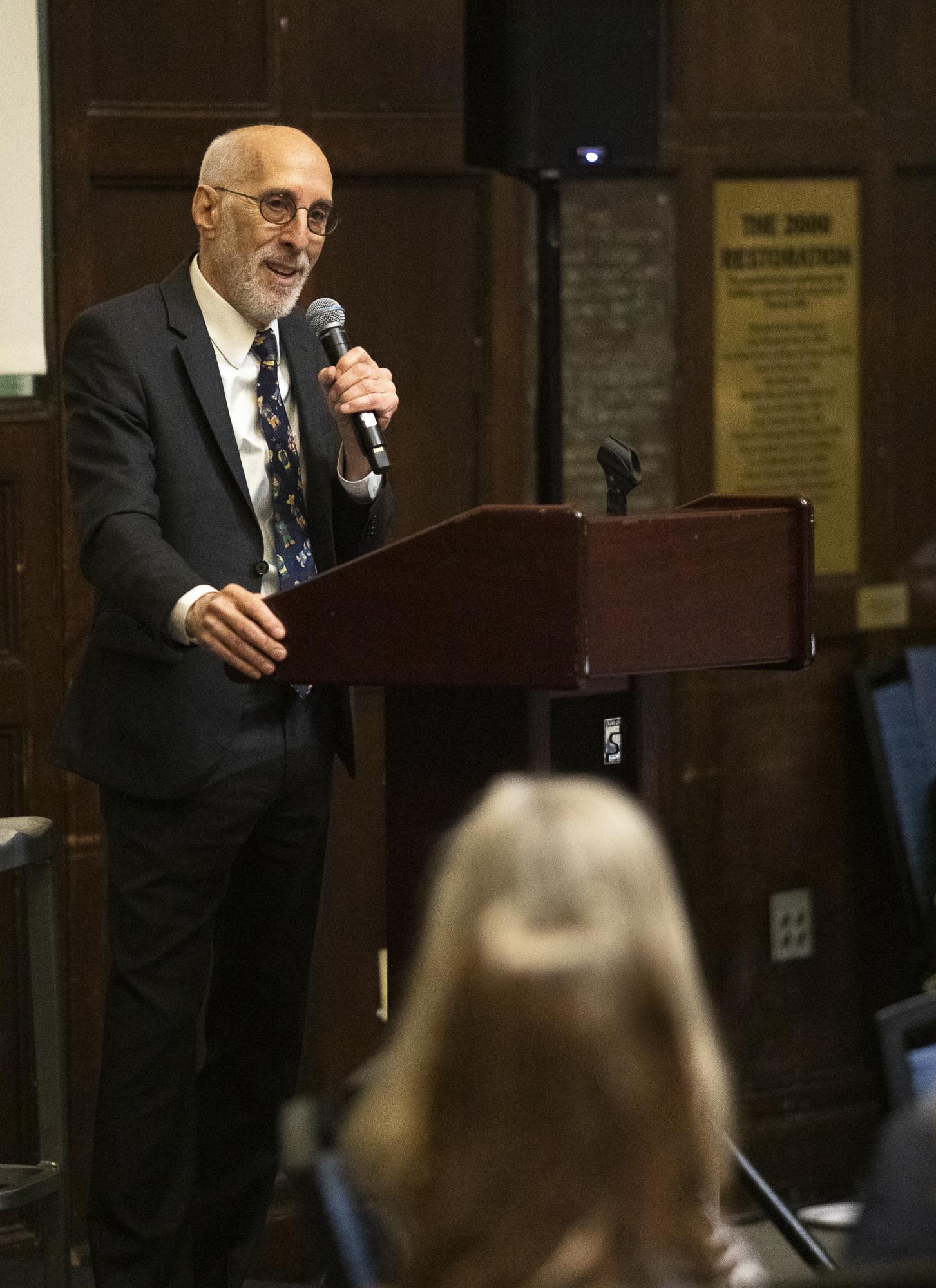Center for School Study Councils celebrates 75 years of leadership and problem-solving
Harris Sokoloff opened this spring’s joint meeting of the Center for School Study Councils like he has so many others for the last 37 years: By asking the gathered school superintendents what was in their hearts.

Because this meeting celebrated the 75th anniversary of the School Study Councils, and because Sokoloff as director has done so much to empower the councils to find their purpose, the answers were unusually focused. One superintendent simply smiled at Sokoloff and replied, “you.”
Since it was launched at Penn GSE, the School Study Councils, four distinct regional groups of education leaders, have served as a place where education leaders can gather to exchange wisdom and solve problems. At their monthly meetings, council members take a deep dive into the biggest questions facing the students, families, and educators in their districts.
The project began in 1943, when Penn GSE brought together seven school districts to create the Philadelphia Suburban School Council. Over the years, the name changed and membership expanded beyond the city’s suburbs to include districts in south central Pennsylvania, New Jersey, and Delaware. Now part of Catalyst @ Penn GSE, the four School Study Councils are looking at ways to help schools innovate.
Through its various iterations, the Center for School Study Councils has always found ways to prepare school leaders to respond to the challenges of their day.
Lee Ann Wentzel, Superintendent of the Ridley School District, noted how education has been transformed over the last 75 years by things like Brown v. Board of Education, Title IX, the Americans with Disabilities Act, and the rise of computers.
“If the arc of that time span has taught us anything in education, school leadership is not just to be Chief Executive Officer in a business model, but a Learner in Chief for a democratic social institution,” Wentzel said. “The council has provided the space for school leadership to study, design, act, reflect, and network with peers to address the newest challenge.”
Through it all, Penn GSE faculty and students have partnered with council members to research issues and create knowledge. The relationship has been transformative, said Penn GSE Dean Pam Grossman.
“Just as GSE faculty are on the cutting edge of educational research, the study council members are on the cutting edge of ways to use that research to improve the quality of teaching, learning, and education,” Grossman said. “Together we are thinking, and rethinking, what it means to be an educational leader.”
A legacy of leadership
When Sokoloff was hired to lead the School Study Councils in 1981, the hiring committee assumed he would stay for three or four years.
But the Councils gave Sokoloff a place to explore a wide variety of interests and forge deep relationships with leaders eager to try new things. Together with his work at Penn GSE promoting civic engagement, Sokoloff found a place he didn’t want to leave.
Sokoloff sees five themes to the Councils’ work: education leadership, organizational leadership, public leadership, change leadership, and evidence-based leadership.
“We have to address the current struggle, but also think about where we’re going,” Sokoloff said.
Over the years, the Study Councils have offered member districts technical assistance and helped them engage with their communities. They have done research studies, authored position papers, offered community budgeting workshops, and conducted strategic planning and visioning sessions.
But the Councils also offer school leaders a supportive network that superintendents said can be a crucial lifeline, especially as they navigate complex challenges. And Judith Wilson, a former Superintendent at Woodbury and Princeton, said that all starts with Sokoloff.
“When a district leader joins the council, that person is immediately in Harris’s wide and deep circle of care. Those in Harris’s council get extra doses of compassion, genuine interest, support, and encouragement,” Wilson said. “We are urged by Harris to do our best possible work, to keep our eye on the goal of serving students, and strengthening the greater public, and to be strong in times of deep challenge or loss.
“Harris often asks councils what is on their hearts as well as their minds. That matters to those of us who practice leadership, and we are grateful to the modeling Harris does for each of us.
“Each of us knows that when we leave a council gathering, we leave with good ideas, with greater determination, with stronger connections, and more possibilities for success and impact than when we began the day. All of that because Harris Sokoloff is a leaders’ leader.”
Harris’s lessons
Grossman called Sokoloff “the heart, the soul, the spirit, and the engine of this vital and vibrant network of educators.”
While Sokoloff leads by amplifying the voices of others, he did use the celebration to offer the three biggest lessons he’s learned leading the councils for 37 years — lessons that will continue to guide the councils in the future.
Listen deeply: When people get together, they often don’t listen for the “problem behind the problem.” Don’t just respond to what someone is saying — ask questions that get underneath it. Watch out for unquestioned assumptions. Because when we only listen on the surface, we only try to solve the surface problem, and we miss our biggest opportunities for change.
Watch the horizon: Don’t just pay attention to what’s going on in the moment. Think about what the near future will bring. Sometimes, that means thinking about shifting educational or community norms. Sometimes, it means paying attention to what’s happening outside of education. When design thinking was starting to get buzz in the business world a decade ago, for example, the Councils held workshops on it.
Be focused, but playful: Playfulness is really about ideas. Don’t be afraid to play with them. Says Sokoloff, “for example, two years ago, one of the study councils indulged me when I had a weird idea. I said, right now we think about schools as pipelines that produce products. What does that mean? What’s our product? What would it look like if we thought of schools not as pipelines but as platforms, the way Airbnb or Uber are platforms? How would that change the way we think about teaching, learning, and the student experience?”
“When they looked through it from that lens, the council members said our product isn’t test scores or diplomas. It’s the learning experience students go through. That thought exercise led three or four superintendents to shift practices in their district.”
